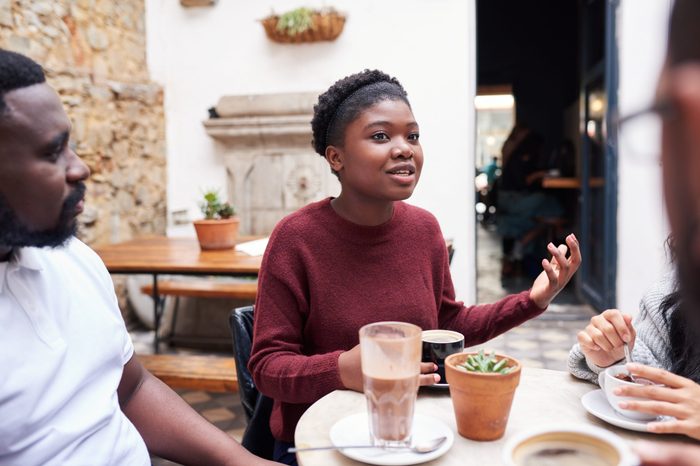
Interrupting people
It happens to everyone who likes chitchatting. Something pops into your head while your friend is speaking, and you interrupt them to blurt it out. Although this might happen occasionally, it’s definitely more of a rude conversation habit for many people. Emilie Dulles, who has more than 29 years of experience in traditional etiquette, says interrupting people is the most common rude conversation habit she encounters.
Interrupting not only expresses a lack of interest or respect for the speaker, but it also stops people from sharing the punchline or pearl of wisdom that might come at the end of their story, according to Dulles. So always let others finish their thoughts completely unless what you have to say is extremely urgent or related to an emergency, adds Bonnie Tsai, the founder and director of Beyond Etiquette.

Overusing sarcasm
Sarcasm is a hit or miss in most conversations, especially if people don’t already know your sense of humor, according to Tsai. So always be mindful of your audience and determine if it’s the right time or place. “If you have to ask whether or not it’s appropriate, it’s most likely not,” says Tsai. If you do make a sarcastic comment that kills the mood, use one of these 9 magic phrases that can save awkward conversations.

Only talking about yourself
Strictly talking about yourself while speaking with others makes you appear narcissistic and inconsiderate of other people and their feelings. “Everyone’s experience and feelings are just as important as yours,” says Tsai. “They want to be able to share their stories just like how you want to share yours.” Not only is talking exclusively about yourself pompous but Julia Esteve Boyd, an international etiquette consultant based in Switzerland who travels globally, says that monopolizing the conversation is just plain irritating and boring. You might be a conversational narcissist if you aren’t able to have a nice balance during a conversation.

Scrolling while speaking
Being distracted by your phone is one of the rude conversation habits that are more popular than ever before, according to Tsai. “Our phones are great for connecting with those who are far away, however, it takes time away from those who we are with in the moment,” says Tsai. If you use your phone during a conversation, it might signal boredom, that you’d rather be elsewhere, or that whatever is happening on your phone is more essential. “The message won’t go away, but the person we are conversing with might,” says Boyd. Using your phone during a conversation is the “height of rudeness,” according to Boyd.

Always needing to be “right”
If the conversation takes turns into more of a debate, don’t worry about being “right.” Insisting on winning an argument doesn’t mean you win the fight since this kind of behavior is rude, says Tsai. “The important thing isn’t about being right or wrong, but understanding where each other is coming from and the ability to empathize with one another without judgment,” says Tsai. “That’s how we can have more productive conversations to help us move forward and learn about one another.” Staying positive and giving people a chance to talk are two things that’ll help you become the most interesting person in the room.

One-upping the other person
So your friend just mentioned their first-ever international trip to Italy—and all you want is to chatter away about your semester abroad in Milan. It might be a good idea to hold off. “Someone else sharing their experience with you doesn’t require you to counter with your own,” says Tsai. “They are simply sharing a personal experience with you rather than hear about how you recently had the same experience or something even better.”

Prepping your response before the end of a story
Too many people these days aren’t actually listening to a conversation intentionally. Instead, they are waiting for their turn to speak, or in the worst cases, interrupting to get to speak right now,” says Dulles. Instead of hearing what you want to say next, Dulles suggests taking a deep breath and taking in what the other person says. After a few seconds pass, it’s your turn to speak. Communication isn’t always as simple as waiting for your turn to talk. You can avoid this rude conversation habit if you practice these 9 things all good listeners do during daily conversations.

Turning every conversation into gossip
Dulles says that gossip is at a new level in conversation today, thanks to social media. Not only is there less time to process information, but this also leads to comparison and envy—turning spectators into critics and gossipers in no time, according to Dulles. Whether you converse via phone or in person, the old adage holds true: If you have nothing nice to say, don’t say anything.

Asking probing questions
Some questions are just too personal for casual or group conversations. And Boyd has to correct her clients for asking these questions that are too personal. Instead, keep all conversational topics neutral. “Talk about your culture, another culture, food, travel, wine, hobbies, local news, and general family questions,” says Boyd. If other people start in with intrusive questions, you can answer them without making things awkward. For people who ask how much money you make say, “Not enough!” Or if your cousin won’t stop asking when you’re having kids say, “I don’t know, but I may need a babysitter one day, can I count on you?” These other tips will also keep you from staying in an awkward situation.

Making inappropriate comments
It’s key to be respectful of other people’s boundaries and sensitivities, regardless of gender or culture. “If you accidentally let an inappropriate comment slip, apologize, take responsibility, and use it as a teaching moment for yourself and others,” says Tsai.

Not reading the room
If there’s one thing you take away from this list of rude conversation habits, it’s the importance of reading the room. This expression is popular because it speaks to the need for self-awareness as well as the awareness of others, according to Dulles. “Your conversation topics, tone, and volume need to be streamlined to the setting and the people around you,” says Dulles. Once you do that, use one of these 37 conversation starters that will make you instantly interesting.

Assuming you’re a good conversationalist
There’s always room for improvement, even if you don’t think you’re guilty of these rude conversation habits. “Conversation etiquette ultimately stems from having respect and consideration for others,” says Tsai. If you aren’t sure whether or not you have any conversation habits that come off as rude, ask your close friends and family to help you out. “They can help you be aware of any quirks or habits you have when you’re spending time with others that can be perceived as inappropriate,” says Tsai. More importantly, once you know these things, you can work on them and become an even better conversationalist.
Sources:
- Emilie Dulles, Dulles Designs
- Bonnie Tsai, founder and director of Beyond Etiquette
- Julia Esteve Boyd, international etiquette consultant